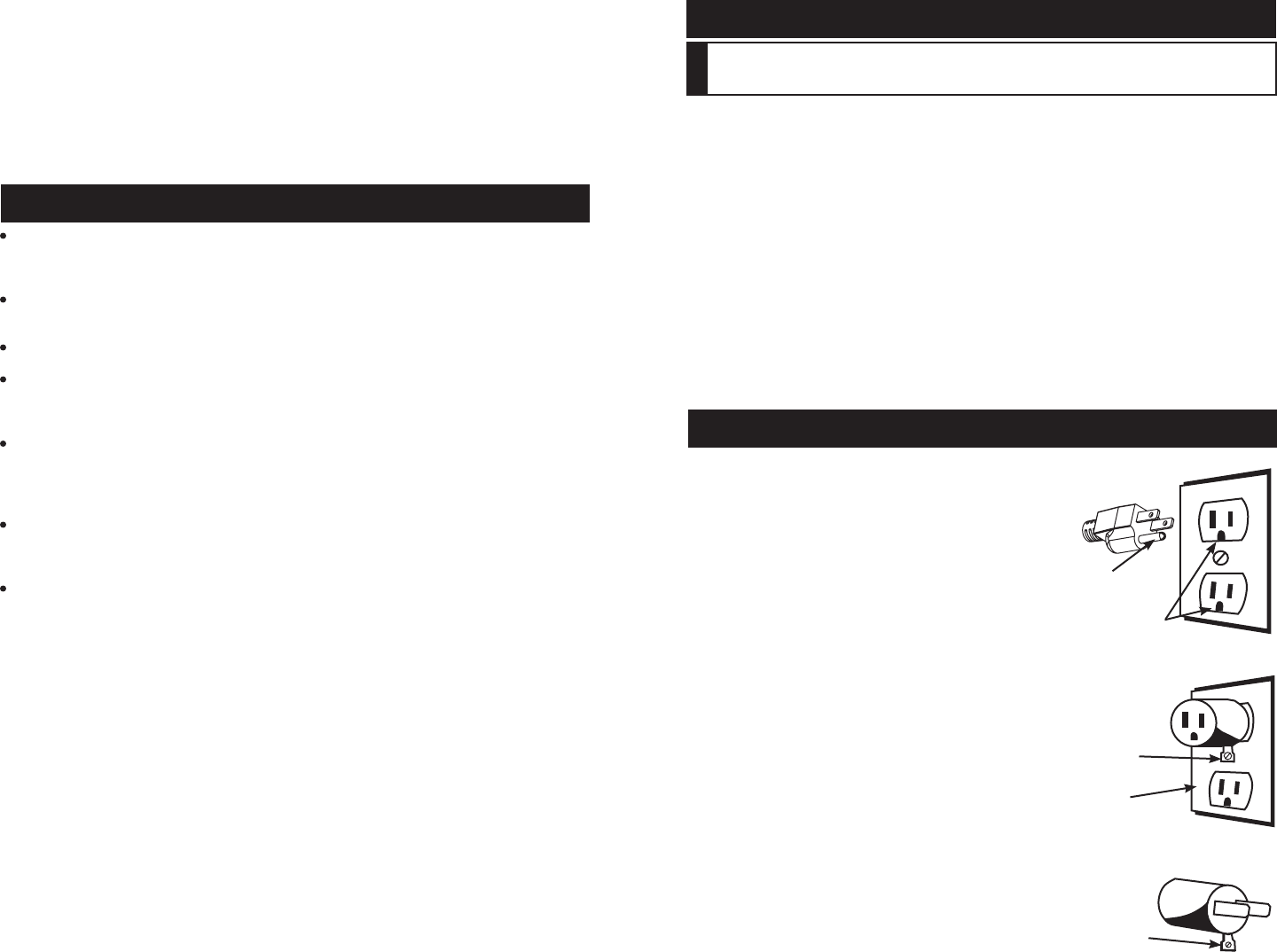
-5-
-12-
GROUNDING
This appliance must be grounded while in use to protect
the operator from electrical shock. The appliance
is equipped with a 3-conductor cord and a 3-prong
grounding type plug to t the proper grounding-type
receptacle. The appliance has a plug that looks like
Figure A. An adaptor, Figure B, should be used for
connecting Figure A plugs to two-prong receptacles.
The grounding tab which extends from the adaptor
must be connected to a permanent ground such as
a properly grounded outlet box as shown in Figure C
using a metal screw.
Figure A
Figure B
Figure C
Circuit
Grounding
Conductor
Grounding
Prong
Metal
Grounding
Screw
Cover of
Grounded
Outlet Box
Grounding
Means
AA2220
GROUNDING INSTRUCTIONS
CLEANING INSTRUCTIONS
1. Clean the Trays and inside the Cabinet before using the Dehydrator for the rst
time and after each use.
2. Push the Power ON/OFF Button to turn off the Dehydrator. Disconnect the
Power Cord from the electrical outlet.
3. Allow the Dehydrator to completely cool before cleaning.
4. Remove the Trays from the Cabinet.
5. Wipe the Cabinet clean, inside and out, with damp sponge or soft cloth. Be
careful not to splash water onto the heating element (located behind the screening
and fan in the back of the Cabinet) while cleaning the inside of the Cabinet. Water
could damage the heating element and the increases the risk of electric shock. DO
NOT immerse the Dehydrator in water.
6. Clean the Trays with warm, soapy water. Rinse with clear water and dry
immediately.
WARNING!! Before cleaning or servicing the Dehydrator, make sure it is unplugged
from the power source. It is important to read & fully understand all of the instructions
& safeguard prior to use of the Dehydrator.
!
TIPS
.
Use the best quality foods. Fruits and vegetables in peak season have more
nutrients and more avor. Do not use food with bruises or blemishes. Bad fruits and
vegetables may spoil the entire batch.
.
Use the best quality meats. Meats, sh and poultry should be lean and fresh.
Remove as much fat as possible before dehydrating.
.
Do not overlap foods. Lay foods at on the Trays.
.
Check dryness after a few hours, then check every two hours until dehydrated.
Open or cut down the middle if a few samples to check internal dryness. If the food
is still moist, dehydrate longer.
.
Use the Drying Guide on the Control Panel as reference for proper temperature
settings. If the heat is set too high, the food may case harden, meaning the food is
dried at too high of a temperature and the food was only dry on the outside, not the
inside. If the temperature is too low, the drying time will increase.
.
Remember, foods will shrink approximately 1/4 to 1/2 their original size and
weight during the dehydration process, so pieces should not be kept too small. One
pound of raw meat will yield approximately 1/3 lb. (0.2 kg) of jerky.
.
Do not place items to be dried on the Drip Tray, there will be no circulation of air
on this Tray. Clean the Drip Tray periodically during dehydration for easier clean-
up.
refrigerated so they cool rapidly. Make sure to cover foods after they are cool.
NOTE:Special considerations must be made when using venison or other wild game,
since it can become heavily contaminated during eld dressing. Venison is often held
at temperatures that could potentially allow bacteria to grow, such as when it is being
transported. Refer to the USDA Meat and Poultry Department for further questions or
information on meat and food safety.
